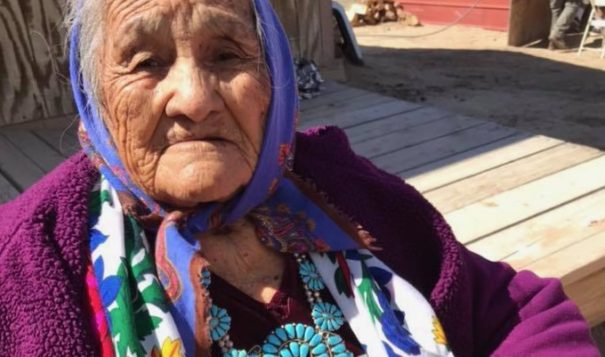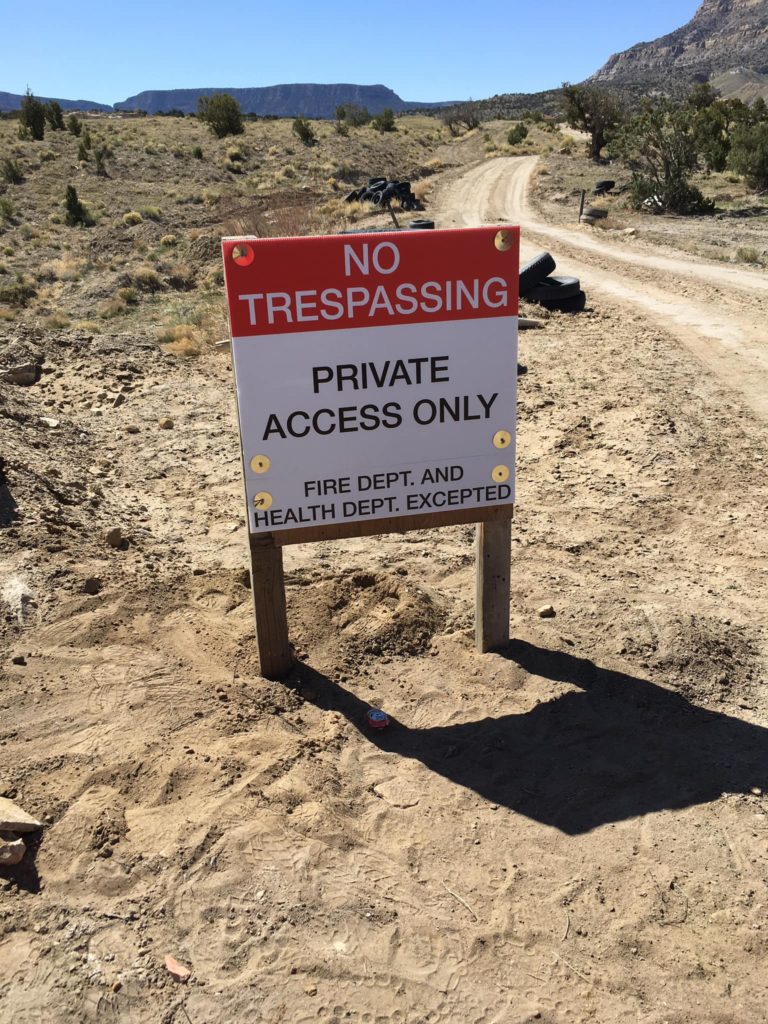 Sally White, 93, is a lifelong resident of Chilchinbito, Ariz.
Sally White, 93, is a lifelong resident of Chilchinbito, Ariz.
This page was updated April 27, 2020
By Jodi Rave
of Buffalo’s Fire
As my family and I continue to withstand the coronavirus pandemic, I’ve watched the virus unfold within two distinct tribal communities. My husband and I live in North Dakota on the Fort Berthold Reservation, the homeland of my tribe, the Mandan, Hidatsa and Arikara Nation. My husband is Navajo, a vast Southwest tribe with homelands in New Mexico, Arizona and Utah.
Both he and I have large extended families. We had been planning a trip from North Dakota to the Navajo Reservation where his relatives were planning a grand celebration for his grandmother Sally White’s birthday. The 93-year-old family matriarch was born in 1928. Her home is nestled below rock terraces of the monolithic Black Mesa in the community of Chilchinbito, Ariz.
We canceled our trip to Chilchinbito after learning some community members who attended a revival there tested positive for COVID-19. Since then, the community has become the epicenter for the spread of coronavirus on the Navajo Reservation.

Overall, there are more than 1,716 positive cases of the virus on the Navajo Reservation and 59 deaths as of April 26. Here at Fort Berthold, we have 32 positive cases and no deaths. Both tribes update COVID-19 cases on tribe-managed websites. Testing results are available on the MHA Nation Community Impact website. The Navajo Nation posts daily COVID-19 updates from the office of the president and vice president.
Continued Precautions
It’s important we all know where to look for information regarding COVID-19 alerts in our communities. The MHA Nation website, also known as the Three Affiliated Tribes, links to a coronavirus page for tribe-related information. And there’s the MHA Nation COVID Task Force Facebook page.
As of the third week in April, the page wasn’t routinely updated. In response, an administrator responded to one complaint: “This has been a challenging time for all of us, and we are grateful to be adding more up to date information! Our past administrators did the best they could!”
In response to coronavirus, the Three Affiliated Tribes Tribal Business Council passed a March 30 tribal resolution calling for coordination with local businesses on the reservation to help prevent spread of the virus. This is an area that needs improvement in some areas of Fort Berthold.
My sister recently filled up with gas and went inside the Eagles Landing convenience store in the Four Bears community. No one was wearing masks, there was no social distancing. She immediately left.
It takes a few extra steps to keep a community safe. Kudos to the South Shore convenience store here in Twin Buttes on the southern end of Fort Berthold. Store managers allow one person to enter the store at a time and patrons must wear a mask or handkerchief. Gloves are provided at the store. The store will expand operations from three days a week to seven days a week beginning April 27. Hours will be limited from 11 a.m. to 3 p.m. until further notice.
Blessings
The last time we visited Sally White at her Chilchinbito home, scores of relatives had gathered for a birthday meal of mutton stew, frybread, corn and plenty of delicious side dishes.
As we finished our meal, the heads of each family stood and spoke in the Navajo language. They gave an update on the latest news from their branch of the family tree. The kids later went hunting for what seemed to be hundreds of brightly colored plastic eggs hidden around rocks and near sage brush. We were all blessed to share that day with Grandma Sally.
Now, the new virus has brought about a sense of foreboding as a number of close and extended family members succumbed to the virus. “It’s scary,” said Alyce White who lives in Chilchinbito with her mother, Sally. “We’re afraid. A lot of people have died.”
Until families can resume large gatherings, President Nez encouraged immediate families to embrace their time at home. He recently told PBS NewsHour: “We’re encouraging our elders to share their stories, the stories of our culture, our tradition and our language, so that our young people don’t remember this as a scary moment.
This is, in a way, what we have been praying for, to reunite families, to reunite couples, to hand down our language, our culture, tradition to the next generation,” Nez said. This is good advice. We can all keep calm and carry on with tradition and culture.
We’re still in midst of a global pandemic even as tribes, states and the country try to resume some sense of normalcy. We must remain vigilant as coronavirus is not yet done with us.
Jodi Rave is the founder of the Indigenous Media Freedom Alliance and of Buffalo’s Fire. She has won journalism awards and recognition from university, mainstream, military and American Indian press organizations.
